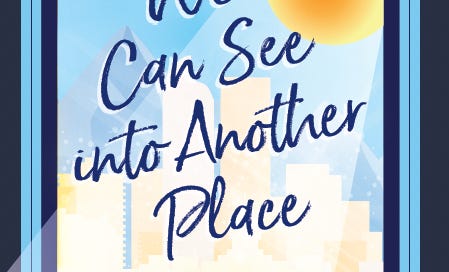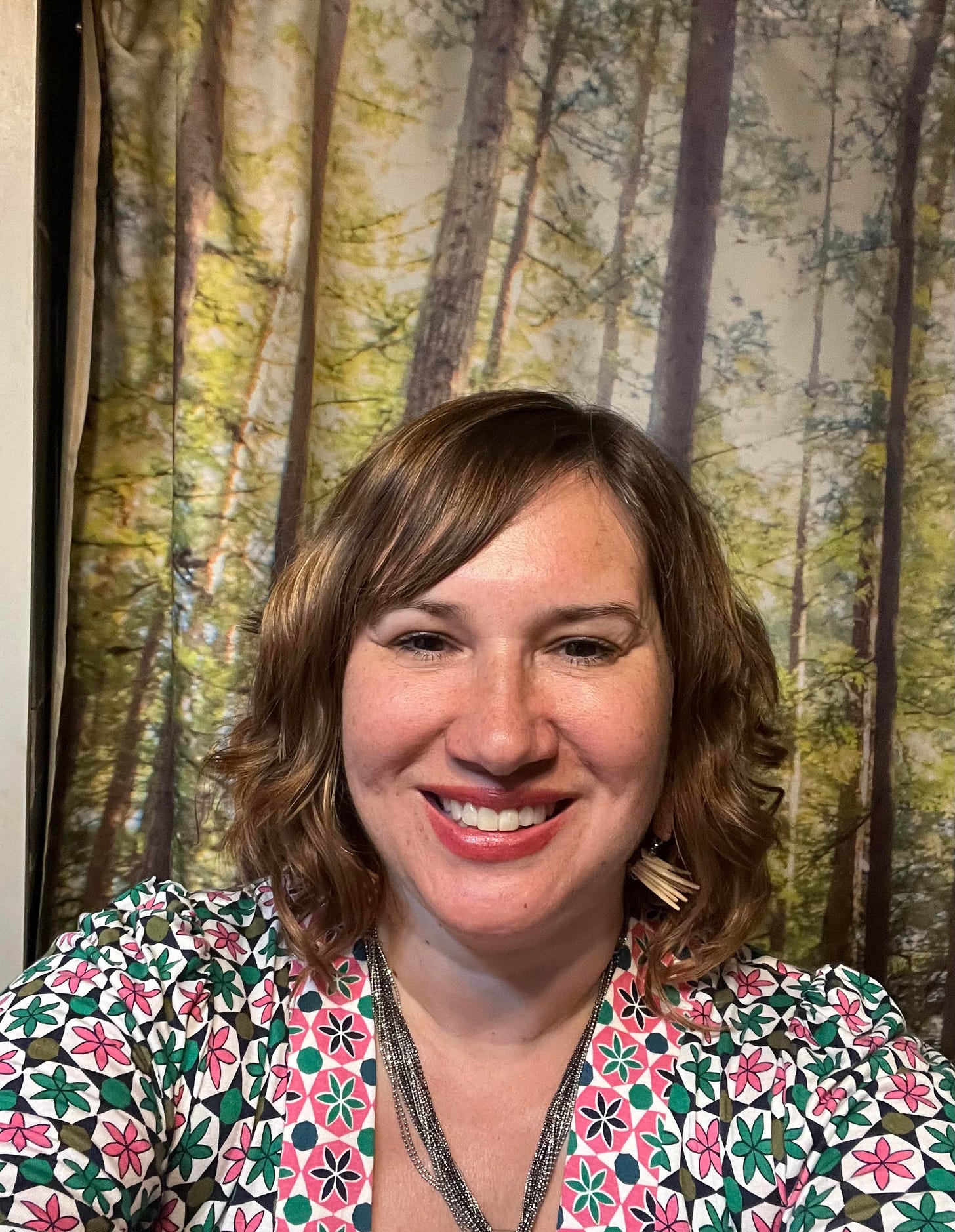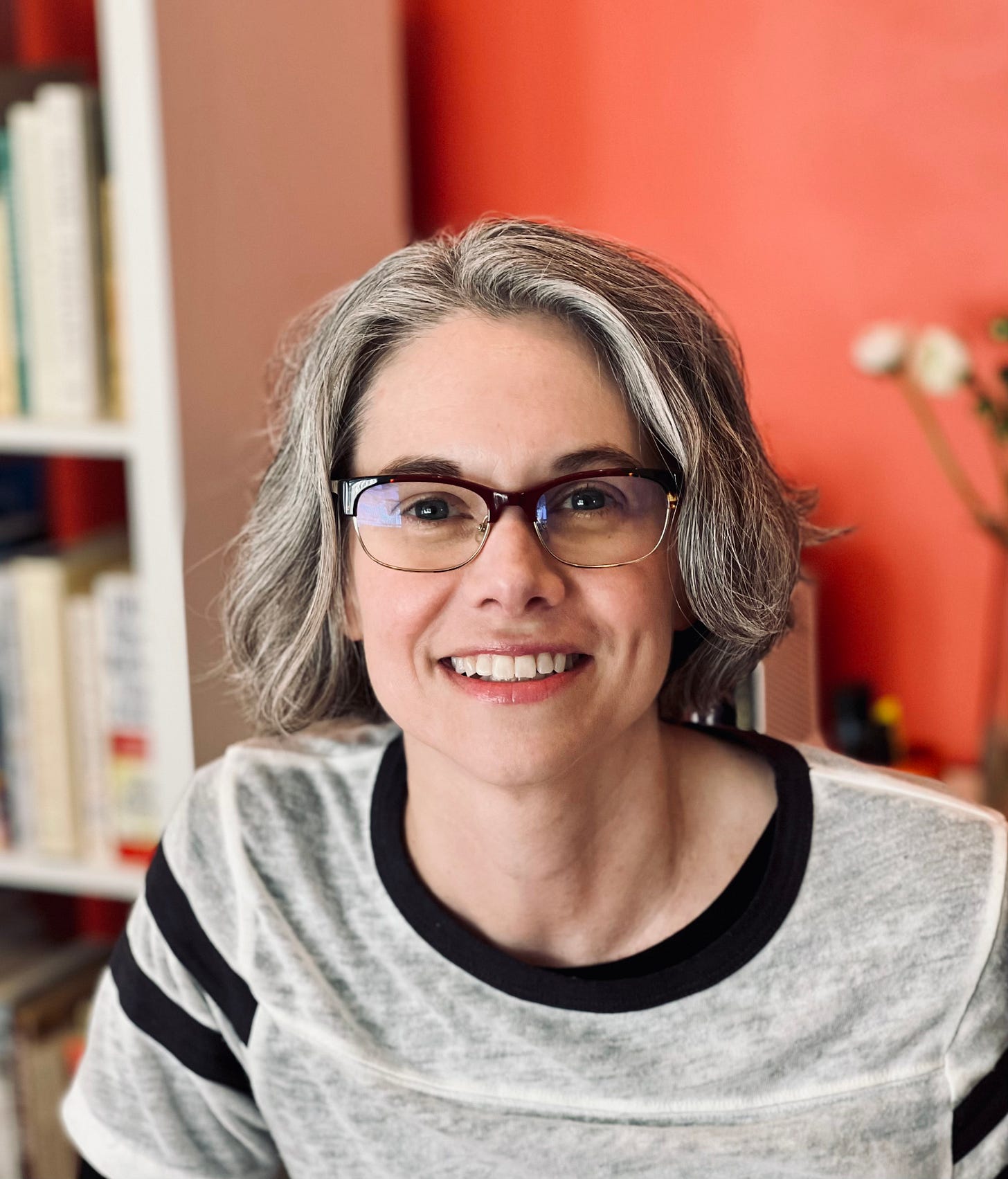The Art of the Literary Anthology: We Can See Into Another Place
A conversation with Andrea Rexilius and Heather Garbo, anthology editor and publisher
Next week’s post is a new agent list (a preview of May’s can be accessed here) and more author interviews are in the queue too. 📗
Today’s post focuses on Denver-based Bookies Press’ forthcoming anthology, We Can See Into Another Place, which features new work by fellow authors and Substackers
, , and , along with more than a dozen other writers and artists including Khadijah Queen, David Heska Wanbli Weiden, Erika T. Wurth, Steven Dunn, R. Alan Brooks, and Lori Ostlund.Anthology editor Andrea Rexilius and publisher, Heather Garbo, spoke with me recently about We Can See Into Another Place’s inception and the hard work of assembling it. As a longtime reader of literary anthologies and the editor of a short fiction anthology, Love in the Time of Time’s Up, I was very curious about the process of putting together the multifaceted We Can See Into Another Place.
When you’re publishing a book with many contributors, there are a sobering number of details to keep track of, not to mention the initial work of courting contributors, working with them on edits, and later, on publicity and promotion. If you’ve thought about putting an anthology together too, I’ve shared the practical of details of creating one in a Bookish post you’ll find here.
On Saturday, June 8, the Lighthouse Writers Workshop LitFest is hosting a reading for We Can See Into Another Place from 5:30 - 6:30 PM MT (3844 York St., Denver) - you can also livestream the reading by registering here. Featured participants: Jenny Shank, Erika T. Wurth, Suzi Q. Smith, Kristen Iversen, Andrea Rexilius. Books will be available for sale. putting together the multifaceted We Can See Into Another Place.
Christine/Bookish: How did the idea for We Can See Into Another Place take root?
Heather Garbo: It was [poet and Regis University’s Mile-High MFA program director] Andrea Rexilius who conceived of an anthology that focused on social justice issues and featured writers with an affiliation to Denver. When she presented this to us and shared the list of potential contributors, we immediately knew this was exactly the kind of book we wanted to publish and we were excited for the opportunity to help get it into the hands of readers.
Andrea Rexilius: I wanted this anthology to be a celebration of the writers and teachers affiliated with Denver communities. Touchstones for developing the collection were writers teaching at the Mile-High MFA in Creative Writing, Lighthouse Writers Workshop, and The Word: A Storytelling Sanctuary.
The social justice theme stemmed from some initial contributions that aligned with the mission of all three organizations and that fortified the purpose and vision of writing and teaching within diverse communities. I also wanted to feature multiple perspectives and genre traditions to showcase creative possibilities across written traditions, as too often conversations about writing and celebrations of writing are isolated across genres.
CS: What were the primary challenges of assembling this anthology?
HG: One challenge that was extremely important to us to get right was ensuring that the collection felt hopeful and not discouraging. These are heavy topics, and we didn’t want readers to feel demoralized as they read. We wanted them to feel seen and validated in their feelings. When Andrea suggested adding a space for readers to be prompted to consider their own feelings on these topics, this felt like a way to empower readers through their own writing. I also think the title, which is a line from one of Carolina Ebeid’s poems, perfectly encapsulates this hopefulness.
CS: The anthology features four sections: Voice, Body, Landscapes, Futures. Did you create these section headers after you'd selected the contents? Were other categories considered?
AR: The section headers were created after all submissions were in and I needed to develop an order and narrative arc for the collection. The approaches to social justice were widely varied, sometimes overt, sometimes subtle, so I began to think about the section breaks as openings, more malleable and in motion, rather than as frameworks, which began to feel too confined and static.
I also wanted to relate these openings to the ideas of intuition and insight that stem from the collection’s title.
How do we “see into another place” via our voices, our bodies, our landscapes (environmental and mental), and how do we allow that seeing/voicing/embodying/inhabiting to shape possible futures through the medium of writing (the act of creating it and of reading it)?
The answer to this question is open-ended and imperfect. There are other voices, bodies, landscapes, futures that still need to be incorporated and considered alongside this collection. This is a starting point among many starting points, but as with any act of writing, there are gestures (of genre, of thought, of history, of vision) that collaborate in new and interesting ways toward the future of engaging and creating community among readers.
CS: There's a tremendous multiplicity of voices and styles in We Can See Into Another Place - in other words, there's so much here to admire. What was something you learned while assembling this book that particularly surprised you?
HG: For me, it was how some of the contributions impacted me personally, even as I reread them countless times.
It’s not hyperbole when I say that I love all the pieces in this collection, and each resonates with me for a different reason.
Like Jenny Shank, I too have a son with sensory processing disorder. And like Rachel Weaver, I’ve navigated the challenges of the medical system while dealing with a debilitating and misunderstood health condition in recent years. But, one moment that felt particularly poignant came directly after a local tragedy, the shooting of a Denver high school teacher by a student who then took his own life.
The next day DPS cancelled all schools in the district for a mental health day, so I was working in my home office as my sons, then 7 and 10, were still asleep. I had a lot of mixed feelings about them being home for the day. I hated that it felt like we were sending the message that they weren’t safe at school, and, at the same time, I couldn’t help feeling like maybe they weren’t safe. It’s also weird to process a tragedy that you’re adjacent to but not directly involved in because it still feels traumatic even though you feel like you don’t have the right to feel traumatized.
So I dove into work for a distraction, and I opened right to R. Alan Brooks’ incredibly powerful comic, “A Tragedy in the Snow,” which recounts a school shooting he experienced when he was younger. Though I know full well how story helps us process our feelings, I was struck by how deeply moving it was to read Alan’s words in that moment as I grappled with my own emotions after yet another shooting.
It also prompted me to immediately write my own thoughts, which was not only cathartic, but after I shared on social media, I had numerous friends comment that this echoed their feelings as well. Alan’s work had this domino effect of helping many of us process these difficult events, and that was exactly our hope for this collection! I just didn’t realize I would experience it on such a personal level.
CS: Would you share information about upcoming events for the anthology—whether in person or online?
Saturday, June 8, 5:30 - 6:30 PM: Lighthouse Writers Workshop (Denver) LitFest Reading, featured participants: Jenny Shank, Erika T. Wurth, Suzi Q. Smith, Kristen Iversen, Andrea Rexilius - books will be available for sale
Tuesday, August 14, 5 - 6:30 PM: Tattered Cover Colfax in Denver, readers TBD
Official publication date: July 1, 2024
We Can See into Another Place can be pre-ordered through Denver’s Bookies Bookstore or wherever books are sold. We encourage you to purchase from your favorite indie bookstore!
Bookshop.org link here
The Bookies Press, formerly BookBar Press, is partnered with Bower House Books.
—
A quick note to welcome Kendall Morgan to Substack! Her newsletter is
. ⭐️And congratulations to Maureen Connolly on the publication of her novel, A Million Miles from Yesterday! (Slainte Press) Bookshop.org link here








Thank you so much! And thank you for your Substack and all your beautiful stories in real amazing books!
Thank you so much for sharing with your readers, Christine! I’m hopeful this incredible collection of powerful voices finds a place in the hearts and on the bookshelves of many readers!